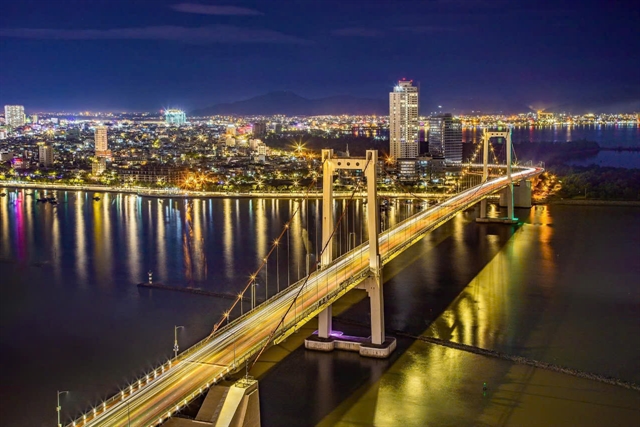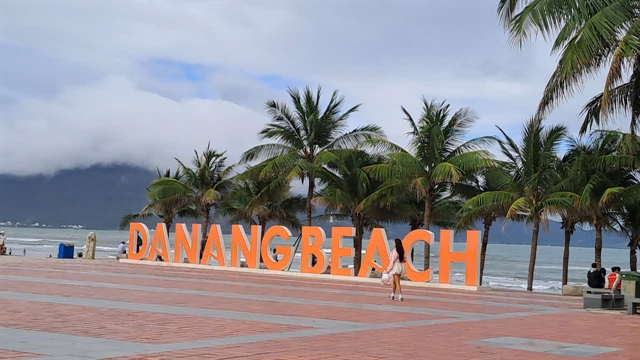 Inner Sanctum
Inner Sanctum

 |
| Nguyễn Thị Hội An, vice director of Đà Nẵng’s Culture, Sports and Tourism Department. Photo courtesy of the director |
The city of Đà Nẵng seeks to be an attraction to international and domestic filmmakers through events such as its Asian Film Festival and dedicated film studio projects. Nguyễn Thị Hội An, vice director of the city’s Culture, Sports and Tourism Department, tells Việt Nam News more about such events.
Inner Sanctum: How is Đà Nẵng’s film industry planning to develop over the following decades?
The investment in the city's film industry will not only create essential infrastructure for film production for international and Vietnamese producers, but also help promote film studio-related experience tourism.
The initiative boasts fully qualified standards for pre- and post-production with advanced technologies, and tourists could enjoy field trips to filming locations through these initiatives.
 |
| A poster featuring Vietnamese actress Khả Ngân in the first joint film project between Việt Nam and India, 'Love in Vietnam'. VNS Photo Công Thành |
Inner Sanctum: The city’s film industry has yet developed in terms of film production, personnel, markets, and other aspects. What are the major solutions for building the industry effectively?
The city will focus on creating a favourable environment for film producers, including easier procedures for film crews and support in surveying film shots, with free entrance fees at destinations and landscapes, as well as accommodation and restaurant discount vouchers during visits to the city.
We are doing our best to promote Đà Nẵng as an open film industry with available natural landscapes of sea, rivers, mountains, and unique architecture.
The city will invest more in infrastructure, while speeding up the construction of the modern film industry in line with designed cultural space and innovation. Public-private partnerships are seen a possible solution in the development of supply chains in film production including equipment and digital applications.
Human resources training is also a key factor in the sustainable development of the film industry in Đà Nẵng. We will work out a plan of seeking young talents for the industry, and building educational links with international and domestic universities and cinema organisations in training future actors and actresses, as well as courses for young people and experts in the industry.
In the meantime, the city will continue hosting the Đà Nẵng Asian Film Festival (DANAFF), which it has done since 2023, while turning film studios and filming locations into attractive tourist destinations as well.
 |
| Thuận Phước Bridge spans over the Hàn River in Đà Nẵng. The bridge and other places in the city have been selected as film locations. Photo courtesy of Quang Nguyễn |
Inner Sanctum: How can the country team up with those in the likes of Hollywood and Bollywood to advance the film industry here?
Building cooperation with Hollywood, Bollywood, South Korea and Japan will offer a positive foundation for our film industry in Đà Nẵng.
Việt Nam and India have already introduced the first-ever joint film project, Love in Vietnam, worth US$4 million, at the third DANAFF. The film was shot at various scenic places in Đà Nẵng including the 5-star Furama Đà Nẵng resort and International Ariyana Convention Centre.
Đà Nẵng has yet to build cooperation with Hollywood, but we have met with experts from Cannes and the Motion Picture Association at the DANAFF.
I think joining workshops and seminars with world-class film producers at the DANAFF offers opportunities in exchanging experience, knowledge, policy, and building a national brand for the film industry.
Additionally, discussions and experience sharing with experts from developed industries in South Korea, Japan and France would speed up practical cooperation in film making in Việt Nam as a whole.
Inner Sanctum: Do you think that Đà Nẵng’s film industry will be a bread-winner in the tourism-based economy?
If the city’s film industry receives proper investment and supportive policies, it would create a huge income from service and filming destination. Đà Nẵng is now hosting 30 domestic and international film crews annually, while revenue could be produced from accommodations and spending from film crews.
Hosting the annual DANAFF also creates a remarkable income from workshops, seminars, film project matching, advertisements and communications.
Filming locations such as Furama Đà Nẵng resort, Bà Nà Hills and Sơn Trà Peninsula can now be favourite destinations as visitors become impressed with movie landscapes.
We believe that if only 5 per cent of total tourists reserved VNĐ5-6 million each for visiting filming locations in Đà Nẵng, film tourism services would achieve revenues of as much as VNĐ5 trillion ($200 million) per year.
Moreover, the film industry will help contribute to the city’s brand promotions, investment, trade and culture.
 |
| Đà Nẵng beach is a top option for tourists as well as film makers. VNS Photo Công Thành |
Inner Sanctum: What are key policies in making the city’s film industry take off?
We need a compatible policy and unique mechanism for the film industry. It needs preferential taxes, fees, land rents, and bank loans for film projects, especially major projects or tourism-based films.
The city should offer a smooth and one-stop administrative procedure for investors in implementation of film projects. It also requires a foundation in creating loans for film projects as well as human resources training and cinema promotions.
Đà Nẵng should also organise more film festivals and workshops that involve the participation of film producers and investors worldwide. It can ensure a transparent environment and friendly policy with high competitiveness in luring national and international investors in development of the film industry.
Ultimately, promoting international cooperation in movie education will be a foundation for long term plans, offering stronger conditions for the enrolment of students in film studies at universities.
Setting up partnerships in film projects among localities will also help build up the national film network while promoting investment from NGOs, communities, individuals, and organisations. VNS




